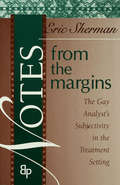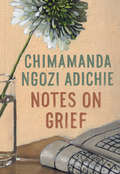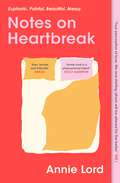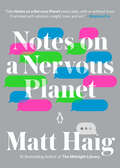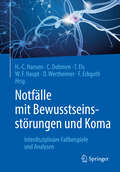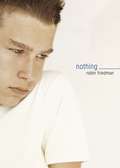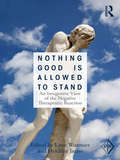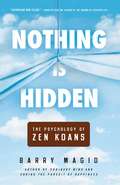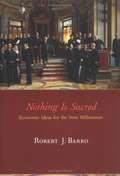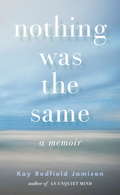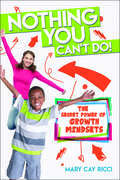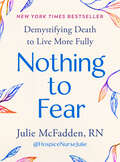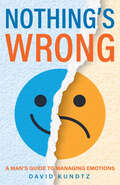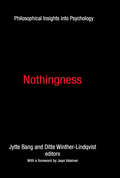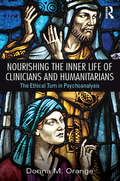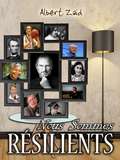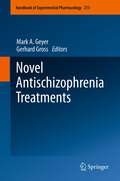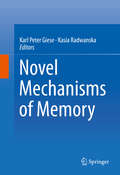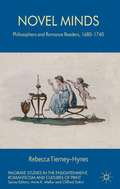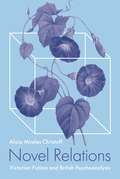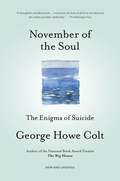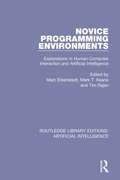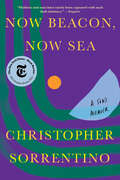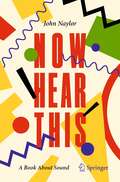- Table View
- List View
Notes from the Margins: The Gay Analyst's Subjectivity in the Treatment Setting
by Eric ShermanMuch has been written about the impact of gender and sexual orientation on the intersubjective field. Yet remarkably little has been written about the unique dilemmas faced by gay clinicians who treat patients of different genders and sexual orientations. Given the particularities of growing up gay in our culture, issues of secrecy, shame, alienation, difference, and internalized homophobia necessarily enter into any gay therapist's developmental history. These factors have a shaping impact on the gay analyst's sensibility, on the way he learns to listen to his patients. In Notes from the Margins, Eric Sherman courageously reveals a wide range of subjective reactions to eight different patients. In detailed clinical vignettes that highlight his thoughts, feelings, personal history, and countertransference struggles, he conveys the experiential immediacy of working as an analyst-and, more specifically, as a gay analyst. Although Sherman is not the first author to write thoughtfully about working in the countertransference, he is among the very few to portray analytic work, particularly in the working through of enactments, as an often untidy affair, marked not only by success but also by the blind spots and insecurities that contribute to failure. Notes from the Margins is not only an illuminating overview of the special challenges faced by gay and lesbian analysts, but a window to grasping the messy realities intrinsic to the psychotherapeutic process.
Notes on Grief
by Chimamanda Ngozi AdichieFrom the globally acclaimed, best-selling novelist and author of We Should All Be Feminists, a timely and deeply personal account of the loss of her father. Notes on Grief is an exquisite work of meditation, remembrance, and hope, written in the wake of Chimamanda Ngozi Adichie's beloved father’s death in the summer of 2020. As the COVID-19 pandemic raged around the world, and kept Adichie and her family members separated from one another, her father succumbed unexpectedly to complications of kidney failure. In this extended essay, which originated in a New Yorker piece, Adichie shares how this loss shook her to her core. She writes about being one of the millions of people grieving this year; about the familial and cultural dimensions of grief and also about the loneliness and anger that are unavoidable in it. With signature precision of language, and glittering, devastating detail on the page--and never without touches of rich, honest humor--Adichie weaves together her own experience of her father’s death with threads of his life story, from his remarkable survival during the Biafran war, through a long career as a statistics professor, into the days of the pandemic in which he’d stay connected with his children and grandchildren over video chat from the family home in Abba, Nigeria. In the compact format of We Should All Be Feminists and Dear Ijeawele, Adichie delivers a gem of a book--a book that fundamentally connects us to one another as it probes one of the most universal human experiences. Notes on Grief is a book for this moment—a work readers will treasure and share now more than ever--and yet will prove durable and timeless, an indispensable addition to Adichie's canon.
Notes on Grief
by Chimamanda Ngozi AdichieNotes on Grief is an exquisite work of meditation, remembrance, and hope, written in the wake of Chimamanda Ngozi Adichie's beloved father’s death in the summer of 2020. <P><P>As the COVID-19 pandemic raged around the world, and kept Adichie and her family members separated from one another, her father succumbed unexpectedly to complications of kidney failure. Expanding on her original New Yorker piece, Adichie shares how this loss shook her to her core. She writes about being one of the millions of people grieving this year; about the familial and cultural dimensions of grief and also about the loneliness and anger that are unavoidable in it. <P><P>With signature precision of language, and glittering, devastating detail on the page--and never without touches of rich, honest humor--Adichie weaves together her own experience of her father’s death with threads of his life story, from his remarkable survival during the Biafran war, through a long career as a statistics professor, into the days of the pandemic in which he’d stay connected with his children and grandchildren over video chat from the family home in Abba, Nigeria. <P><P>In the compact format of We Should All Be Feminists and Dear Ijeawele, Adichie delivers a gem of a book--a book that fundamentally connects us to one another as it probes one of the most universal human experiences. Notes on Grief is a book for this moment—a work readers will treasure and share now more than ever--and yet will prove durable and timeless, an indispensable addition to Adichie's canon.
Notes on Heartbreak: the must-read book of the summer
by Annie LordFierce, funny and raw, this unflinchingly honest exploration of heartbreak is so much more than a book about one single break-up'Arresting and vivid, raw and breathtaking...told with stunning originality.' Dolly Alderton 'Painful while it sloughs away the dead romantic ideals, leaving you cleansed, reborn and gorgeously satisfied.' Pandora Sykes 'A beautiful tender messy brilliant generous open-hearted book.' Emma Gannon This is a love story told in reverse. It's about the best and worst of love: the euphoric and the painful. The beautiful and the messy. Reeling from a broken heart, Annie Lord revisits the past - from the moment she first fell in love, the shared in-jokes and intertwining of a long-term relationship, to the months that saw the slow erosion of a bond five years in the making. It is an unflinchingly honest reminder of the simultaneous joy and pain of being in love that will resonate with anyone that has ever nursed a broken heart. 'An electrifying debut.' Caroline O'Donoghue 'Annie Lord tells us a story at once both specific and universal.' Shon Faye
Notes on a Nervous Planet
by Matt HaigA follow-up to Matt Haig's internationally bestselling memoir, Reasons to Stay Alive, a broader look at how modern life feeds our anxiety, and how to live a better life.The societies we live in are increasingly making our minds ill, making it feel as though the way we live is engineered to make us unhappy. When Matt Haig developed panic disorder, anxiety, and depression as an adult, it took him a long time to work out the ways the external world could impact his mental health in both positive and negative ways. Notes on a Nervous Planet collects his observations, taking a look at how the various social, commercial and technological "advancements" that have created the world we now live in can actually hinder our happiness. Haig examines everything from broader phenomena like inequality, social media, and the news; to things closer to our daily lives, like how we sleep, how we exercise, and even the distinction we draw between our minds and our bodies.
Notfälle mit Bewusstseinsstörungen und Koma: Interdisziplinäre Fallbeispiele und Analysen
by Hans-Christian Hansen Frank Erbguth Christian Dohmen Thomas Els Walter F. Haupt Daniel WertheimerAnhand von 36 realen Fällen mit akuter Störung des Bewusstseins aller Altersstufen schildert dieses Buch, wie Stufendiagnostik und Therapiemaßnahmen aufgebaut sind und wie sie sich im weiteren Behandlungsprozess ständig in kritischer Überprüfung befinden. Das Spektrum der zugrunde liegenden Hirnfunktionsstörungen umfasst neurologische, psychiatrische, internistische und unfallchirurgische Erkrankungen. Lehrreich sind sowohl die Kasuistiken mit günstigem Behandlungsergebnis als auch die Verläufe von Patienten, die ihre Erkrankung nicht überlebt hatten. Die Fallschilderung erfolgt systematisch und praxisorientiert nach Anamnese, Diagnostik und Befund, Therapie und Verlauf, Fazit und Tak-Home-Messages. Zielgruppen sind praktisch tätige Neurologen, Internisten, Intensivmediziner, Notfallmediziner und Psychiater.
Nothing
by Robin FriedmanThe most popular guy at his high school, 17-year-old Parker Rabinowitz is wealthy, smart, and drop-dead handsome. Parker's got just one problem: he's bulimic. "Nothing" is presented in two distinct first-person voices.
Nothing Good Is Allowed to Stand: An Integrative View of the Negative Therapeutic Reaction (Psychoanalytic Inquiry Book Series)
by Léon Wurmser Heidrun JarassWork with patients with severe neuroses very often has to cope with the phenomenon that every progress in the analytic or therapeutic work is followed paradoxically by a clinical deterioration. There are a number of dynamic factors that converge to bring about this negative therapeutic reaction, including many-layered guilt and shame, aspects of envy and jealousy, attachment to negative affects, turning trauma from passive to active, conflicts within the superego, and the defensive use of omnipotence of responsibility. In Nothing Good Is Allowed to Stand, Wurmser, Jarass, and their colleagues consider these and other factors insightfully, such as the extent to which traumatization lives on in self-directed aggressions of the superego in the claim of omnipotence; the significant role of deep conflicts between opposite values and loyalties in bringing about the prohibition of anything "good" and thus of the negative therapeutic reaction in particular and masochism in general; and the extent to which envy, jealousy, and resentment can be encountered in the "inner object," the "inner judge" (i.e., the superego), and how they are directed against the self.
Nothing Is Hidden
by Barry MagidIn this inspiring and incisive offering, Barry Magid uses the language of modern psychology and psychotherapy to illuminate one of Buddhism's most powerful and often mysterious technologies: the Zen koan. What's more, Magid also uses the koans to expand upon the insights of psychology (especially self psychology and relational psychotherapy) and open for the reader new perspectives on the functioning of the human mind and heart. Nothing Is Hidden explores many rich themes, including facing impermanence and the inevitability of change, working skillfully with desire and attachment, and discovering when "surrender and submission" can be liberating and when they shade into emotional bypassing. With a sophisticated view of the rituals and teachings of traditional Buddhism, Magid helps us see how we sometimes subvert meditation into just another "curative fantasy" or make compassion into a form of masochism.
Nothing Is Sacred: Economic Ideas for the New Millenium
by Robert J. BarroSince the 1970s, Robert Barro's academic research has significantly influenced macroeconomic theory. For more than a decade, his writing has also enlivened the pages of publications such as the Wall Street Journal and Business Week. In Nothing Is Sacred, Barro applies his well-honed free market arguments to a remarkably diverse range of issues. These include global problems such as growth and debt, as well as social issues such as the predictive value of SAT scores, drug legalization, the economics of beauty, and the relationship between abortion rights and crime reduction. The book opens with a series of essays on famous economists, past and present, and other prominent figures whose work has economic implications, including Joe DiMaggio and Bono. In the book's second part, Barro discusses the economics of social issues. In the third part, he considers democracy, growth, and international policy, and in the final part he examines fiscal policy, monetary policy, and the macroeconomy. Throughout, he shows that even the most widely held beliefs are not sacred truths but are open to analysis.
Nothing Was the Same: A Memoir
by Kay Redfield JamisonFrom the internationally acclaimed author of An Unquiet Mind, comes a haunting meditation on mortality, grief, and loss. Perhaps no one but Kay Jamison - who combines the acute perceptions of a psychologist with writerly elegance and passion - could bring such a delicate touch to the subject of losing a spouse to cancer. In spare and at times strikingly lyrical prose, Jamison looks back at her relationship with her husband, Richard Wyatt, a renowned scientist who battled severe dyslexia to become one of the foremost experts on schizophrenia. And with characteristic honesty, she describes his slow surrender to cancer, her own struggle with overpowering grief, and her efforts to distinguish grief from depression. But she also recalls the joy that Richard brought her during the nearly twenty years they had together. Wryly humorous anecdotes mingle with bittersweet memories of a relationship that was passionate and loving - if troubled on occasion by her manic depression - as Jamison reveals the ways in which Richard taught her to live fully through his courage and grace. A penetrating study of grief viewed from deep inside the experience itself, Nothing Was the Same is also a deeply moving memoir by a superb writer.
Nothing You Can't Do!: The Secret Power of Growth Mindsets
by Mary Cay RicciHave you ever thought about your dreams and if you could achieve them? Guess what? You can! You can find your full potential and become more successful than you ever dreamed possible—it just takes changing the way you think to change your life. Unlock the secrets and clues to success in school, sports, afterschool activities, life, and so much more with the tips in Nothing You Can't Do!: The Secret Power of Mindsets. By discovering the secrets included in this illustrated, funny, and interactive book, you'll learn how to develop a growth mindset, where you look at life through a more optimistic lens, learn how to handle mistakes in a positive way, and find all the possibilities in yourself, even those you didn't know were there! With the power of a changed mindset, there's nothing you can't do!
Nothing to Fear: Demystifying Death to Live More Fully
by Julie McFaddenA comforting and informative guide that demystifies our end-of-life journey, from the compassionate expert known as @hospicenursejulieWhat if we didn&’t consider death the worst possible outcome? What if we discussed it honestly, embraced hospice care, and prepared for the end of our lives with hope and acceptance? In this compassionate and knowledgeable guide, TikTok star Julie McFadden—known online as &“Hospice Nurse Julie&”—shares the valuable lessons she&’s learned in her fifteen years as an RN in the ICU and in hospice. Expertly interweaving emotional insight and practical advice, Nothing to Fear demystifies end-of-life care for both patients and caregivers, covering topics including:the biological details of dyingwhich medical interventions help and which only make things worsethe otherworldly beauty of deathbed phenomenafinancial and logistical preparations for deathfacts and myths about hospice carethe most important conversations to have before you diethe grieving process, before and after death Sure to be a go-to resource for years to come, McFadden&’s first book proves a better death goes hand in hand with a better life.
Nothing's Wrong: A Man's Guide to Managing Emotions
by David KundtzMen, It’s Time to Master your EmotionsToo often Men are told to bottle up how they feel which leads to emotional numbness. Men, take the reins back and master your emotions with this guide to emotional healing.Every man has a deep bed of emotions. Emotions and feelings shouldn’t be ignored. To get the great and healthy relationships you desire, you need to change the way that you manage your emotions. David Kundtz has created this full guide to steer you towards emotional healing.Men, master your emotions. Emotions are diverse, learn all of different ways to spot your emotions and how to better express emotions. Become comfortable with your emotions, tune in to the emotions around you, and learn good communication skills. Men, this book is for you. This motivational book is dedicated to teenage boys, young men, fathers, and grandfathers. Build your emotional confidence and your communication skills. The language, tools, and the exercises inside of this book are designed to help you express the deep, vibrant and ever-present emotions that you hold inside of you. Nothing’s Wrong is packed with:Processes to identify and master your emotionsInformation for teenage boys, young men, fathers, and grandfathers Tips and Tools to aide you on your path towards emotional healingIf you enjoyed motivational books like Cry Like A Man, Master Your Emotions, or The Mental Toughness, then you’ll love Nothing’s Wrong.
Nothingness: Philosophical Insights into Psychology (History And Theory Of Psychology Ser.)
by Jytte BangThis book addresses nothingness as not only the intangible presence of an emotional, cultural, social, or even political void that is felt on an existential level, but has some solid foundations in reality. The death of a loved one, the social isolation of an individual, or the culture shock one may experience in another country are examples of situations in which an external sense of absence mirrors an internal psychological and philosophical sense of nothingness.Not much has been explicitly written on nothingness in the history of psychology. On the other hand, nothingness seems to be implicitly embedded in many scholars' work. This duality of explicitly and implicitly expressed ideas about nothingness reveals how psychology finds inspiration in philosophy, and vice versa. The book aims to illustrate how the concept of the presence of absence�nothingness�fills a void in contemporary psychological theorizing.
Nourishing the Inner Life of Clinicians and Humanitarians: The Ethical Turn in Psychoanalysis
by Donna M. OrangeNourishing the Inner Life of Clinicians and Humanitarians: The Ethical Turn in Psychoanalysis, demonstrates the demanding, clinical and humanitarian work that psychotherapists often undertake with fragile and devastated people, those degraded by violence and discrimination. In spite of this, Donna M. Orange argues that there is more to human nature than a relentlessly negative view. Drawing on psychoanalytic and philosophical resources, as well as stories from history and literature, she explores ethical narratives that ground hope in human goodness and shows how these voices, personal to each analyst, can become sources of courage, warning and support, of prophetic challenge and humility which can inform and guide their work. Over the course of a lifetime, the sources change, with new ones emerging into importance, others receding into the background. Donna Orange uses examples from ancient Rome (Marcus Aurelius), from twentieth century Europe (Primo Levi, Emmanuel Levinas, Dietrich Bonhoeffer), from South Africa (Nelson Mandela), and from nineteenth century Russia (Fyodor Dostoevsky). She shows how not only can their words and examples, like those of our personal mentors, inspire and warn us; but they also show us the daily discipline of spiritual self-care, although these examples rely heavily on the discipline of spiritual reading, other practitioners will find inspiration in music, visual arts, or elsewhere and replenish the resources regularly. Nourishing the Inner Life of Clinicians and Humanitarians will help psychoanalysts to develop a language with which to converse about ethics and the responsibility of the therapist/analyst. This is an exceptional contribution highly suitable for practitioners and students of psychoanalysis and psychotherapy. Donna M. Orange teaches, consults, and offers study groups for psychoanalysts and gestalt therapists. She seeks to integrate contemporary psychoanalysis with radically relational ethics. Recent books are Thinking for Clinicians: Philosophical Resources for Contemporary Psychoanalysis and the Humanistic Psychotherapies (2010), and The Suffering Stranger: Hermeneutics for Everyday Clinical Practice (2011), both from Routledge.
Nous Sommes Résilients
by Antony Gautier Morales Albert ZaidNarration des expériences de quelques personnes considérées comme d'authentitques résilientes, qui ont servi de modèle et d'exemple de dépassement pour des millions de personnes dans le Monde. En ingéniérie on dit que la résilience d'un matériau est sa capacité à absorber un impact et à engranger de l'énergie sans se déformer. Pour la neuroscience, c'est le potentiel à affronter une situation adverse, la surpasser et en sortir plus fort.En psychologie on dit que c'est la capacité que les personnes ont à assumer des circonstances traumatiques et à se rétablir. Dépassement et rétablissement vont de pair. Personnes considérées comme d'authentiques résilientes À savoir: Silvia Válori, Stephen Hawking, Abraham Lincoln, Nelson Mandela, Ismael Santos, Ana Frank, Ángel Sanz, Helen Keller, Kyle Maynard, Albert LLovera, El Equipo Hoyt, Kalpana Saroj, Pablo Pineda, Sean Maloney, Sara Navarro, Steve Jobs, Teresa Silva, Tim Guénard, Carlota Ruiz de Dulanto. Ce livre inclut aussi une liste importante de livres recommandés avec leurs résumés explicatifs.
Novel Antischizophrenia Treatments
by Gerhard Gross Mark A. GeyerThis volume tries to put current therapy - achievements, shortcomings, remaining medical needs - and emerging new targets into the context of increasing knowledge regarding the genetic and neurodevelopmental contributions to the pathophysiology of schizophrenia. Some of the chapters also deal with respective experimental and clinical methodology, biomarkers, and translational aspects of drug development. The volume concentrates on reviewing the ongoing research attempting to identify novel treatments for the cognitive deficits and negative symptoms of schizophrenia, which are not treated adequately by current antipsychotic medications.
Novel Mechanisms of Memory
by Karl Peter Giese Kasia RadwanskaThis book integrates discoveries from recent years to show the diversity of molecular mechanisms that contribute to memory consolidation, reconsolidation, extinction, and forgetting. It provides a special focus on the processes that govern functional and structural plasticity of dendritic spines. In nine chapters, new and important ideas related to learning and memory processes will be presented. Themes discussed include the role of AMPA receptors in memory, two signalling cascades involved in local spine remodelling and memory, the role of extracellular matrix proteins in memory, the regulation of gene expression and protein translation, and mechanisms of retrieval-induced memory modulation and forgetting. We believe that the study of these topics represents a great step toward understanding the complexity of the brain and the processes it governs.
Novel Minds
by Rebecca Tierney-HynesEighteenth-century philosophy owes much to the early novel. Using the figure of the romance reader this book tells a new story of eighteenth-century reading. The impressionable mind and mutable identity of the romance reader haunt eighteenth-century definitions of the self, and the seductions of fiction insist on making an appearance in philosophy.
Novel Relations: Victorian Fiction and British Psychoanalysis
by Professor Alicia Mireles ChristoffNovel Relations engages twentieth-century post-Freudian British psychoanalysis in an unprecedented way: as literary theory. Placing the writing of figures like D. W. Winnicott, W. R. Bion, Michael and Enid Balint, Joan Riviere, Paula Heimann, and Betty Joseph in conversation with canonical Victorian fiction, Alicia Christoff reveals just how much object relations can teach us about how and why we read. These thinkers illustrate the ever-shifting impact our relations with others have on the psyche, and help us see how literary figures—characters, narrators, authors, and other readers—shape and structure us too. For Christoff, novels are charged relational fields.Closely reading novels by George Eliot and Thomas Hardy, Christoff shows that traditional understandings of Victorian fiction change when we fully recognize the object relations of reading. It is not by chance that British psychoanalysis illuminates underappreciated aspects of Victorian fiction so vibrantly: Victorian novels shaped modern psychoanalytic theories of psyche and relationality—including the eclipsing of empire and race in the construction of subject. Relational reading opens up both Victorian fiction and psychoanalysis to wider political and postcolonial dimensions, while prompting a closer engagement with work in such areas as critical race theory and gender and sexuality studies.The first book to examine at length the connections between British psychoanalysis and Victorian fiction, Novel Relations describes the impact of literary form on readers and on twentieth- and twenty-first-century theories of the subject.
November of the Soul
by George Howe ColtWritten with the same graceful narrative voice that made his bestselling National Book Award finalist The Big House such a success, George Howe Colt's November of the Soul is a compassionate, compelling, thought-provoking, and exhaustive investigation into the subject of suicide. Drawing on hundreds of in-depth interviews and a fascinating survey of current knowledge, Colt provides moving case studies to offer insight into all aspects of suicide -- its cultural history, the latest biological and psychological research, the possibilities of prevention, the complexities of the right-to-die movement, and the effects on suicide's survivors. Presented with deep compassion and humanity, November of the Soul is an invaluable contribution not only to our understanding of suicide but also of the human condition.
Novice Programming Environments: Explorations in Human-Computer Interaction and Artificial Intelligence (Routledge Library Editions: Artificial Intelligence #4)
by Mark T. Keane Marc Eisenstadt Tim RajanThis book, originally published in 1992, encapsulates ten years of research at the Open University’s Human Cognition Research Laboratory. The research investigates the problems of novice programmers, and is strongly oriented toward the design and implementation of "programming environments" aimed at eliminating or easing novices’ problems. A range of languages is studied: Pascal, SOLO, Lisp, Prolog and "Knowledge Engineering Programming". The primary emphasis of the empirical studies is to gain some understanding of novices’ "mental models" of the inner workings of computers. Such (erroneous) models are constructed by novices in their own heads to account for the idiosyncrasies of particular programming languages. The primary emphasis of the implementations described in the book is the provision of "automatic debugging aids", i.e. artificial intelligence programs which can analyse novices’ buggy programs, and make sense of them, thereby providing useful advice for the novices. Another related strand taken in some of the work is the concept of "pre-emptive design", i.e. the provision of tools such as syntax-directed editors and graphical tracers which help programmers avoid many frequently-occurring errors. A common thread throughout the book is its Cognitive Science/Artificial Intelligence orientation. AI tools are used, for instance, to construct simulation models of subjects writing programs, in order to provide insights into what their deep conceptual errors are. At the other extreme, AI programs which were developed in order to help student debug their programs are observed empirically in order to ensure that they provide facilities actually needed by real programmers. This book will be of great interest to advanced undergraduate, postgraduate, and professional researchers in Cognitive Science, Artificial Intelligence, and Human-Computer Interaction.
Now Beacon, Now Sea: A Son's Memoir
by Christopher SorrentinoA wrenching debut memoir of familial grief by a National Book Award finalist—and a defining account of what it means to love and lose a difficult parent, for readers of Joan Didion and Dani Shapiro. <p><p> When Christopher Sorrentino's mother died in 2017, it marked the end of a journey that had begun eighty years earlier in the South Bronx. Victoria's life took her to the heart of New York's vibrant mid-century downtown artistic scene, to the sedate campus of Stanford, and finally back to Brooklyn—a journey witnessed by a son who watched, helpless, as she grew more and more isolated, distancing herself from everyone and everything she'd ever loved. <p><p> In examining the mystery of his mother's life, from her dysfunctional marriage to his heedless father, the writer Gilbert Sorrentino, to her ultimate withdrawal from the world, Christopher excavates his own memories and family folklore in an effort to discover her dreams, understand her disappointments, and peel back the ways in which she seemed forever trapped between two identities: the Puerto Rican girl identified on her birth certificate as Black, and the white woman she had seemingly decided to become. Meanwhile Christopher experiences his own transformation, emerging from under his father's shadow and his mother's thumb to establish his identity as a writer and individual—one who would soon make his own missteps and mistakes. <p><p> Unfolding against the captivating backdrop of a vanished New York, a city of cheap bohemian enclaves and a thriving avant-garde—a dangerous, decaying, but liberated and potentially liberating place—Now Beacon, Now Sea is a matchless portrait of the beautiful, painful messiness of life, and the transformative power of even conflicted grief.
Now Hear This: A Book About Sound
by John NaylorThis book explains the nature of sound both as a physical phenomenon and as a sensation, how it travels through air and water, and how the hearing system evolved to convert these vibrations into sensations. Drawing on physics, biology, neuroscience, philosophy, literature, history, anecdote, and personal experience, "Now Hear This" is a wide-ranging exploration of the nature of sound and hearing that opens up a fascinating world of sounds from the mundane to the unusual and seeks above all to persuade the reader of the wisdom of John Cage’s advice that “Wherever we are what we hear is mostly noise. When we ignore it, it disturbs us. When we listen to it, we find it fascinating.”
